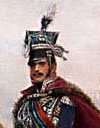 |
| Barclay de Tolly |
The pace of events began to quicken. On the 23rd Davout was engaged in a sharp action against Bagration at Mohilev and succeeded in denying the Russians passage northward; that is to say, the French were still successfully interposing their troops between the two Russian armies. The 24th saw Napoleon at Biechenkovski, carrying out a personal reconnaissance of the further bank of the Dvina; that same day a handful of captured Russian stragglers confirmed that Barclay was in person at Vitebsk. The uncertainty was now over. During the night the French set off for Vitebsk along the Dvina's left bank, still intent on forcing a battle on an unreinforced Barclay. On the 25th and 26th Napoleon really believed that this had at last materialized; on both days Murat's cavalry was engaged with Russian forces at Ostronovo, and the belief grew that the foe was indeed courting battle. Convinced that Barclay was now at his mercy, Napoleon withstood the temptation to attack at once with the forces at hand, and ordered his troops to wait for one day to allow reinforcements to close up.
This delay was the Emperor's great mistake; it is true that Barclay had originally intended to face the French at Vitebsk, but when he learned that there was no longer any chance of Bagration moving up through Orsha (owing to Davout's successful blocking action at Mohilev), he changed his mind and decided to slip away toward a new rendezvous at Smolensk. By delaying his attack for the space of one day, Napoleon unwittingly gave Barclay the chance to get clear; consequently, when the French advanced in full panoply of battle on teh morning of the 28th, they found Vitebsk in its turn evacuated by the elusive foe. And so Napoleon experienced his second disappointment of the campaign; twice the neck of the strategic net had been pulled tight, but on each occasion the prey had narrowly eluded capture.
There was now little chance of catching Barclay this side of Smolensk; there were too many good roads for his army to use. Similarly, there was little hope of preventing Bagration from making a successful rendezvous with his collegue. Napoleon's strategy had come to naught, and he failed to force a decisive engagement on a divided foe. He could hardly console himself with the knowledge that he had inflicted some 8,000 casualties on the foe and had been in possession of "the principal military position in Europe." There was no disguising the fact that the Grande Armee had worn itself to a shadow in the process. The weather was excessively hot, and the number of sick had risen alarmingly; the loss of horses had been particularly severe. The route of the army was marked with putrefying corpses which undoubtedly served to raise the sickness rate.
~D. Chandler, The Campaigns of Napoleon; p. 799
My good friend Peter will be by tomorrow, perhaps we will do some Garden Wars about all of this ...






















































No comments:
Post a Comment